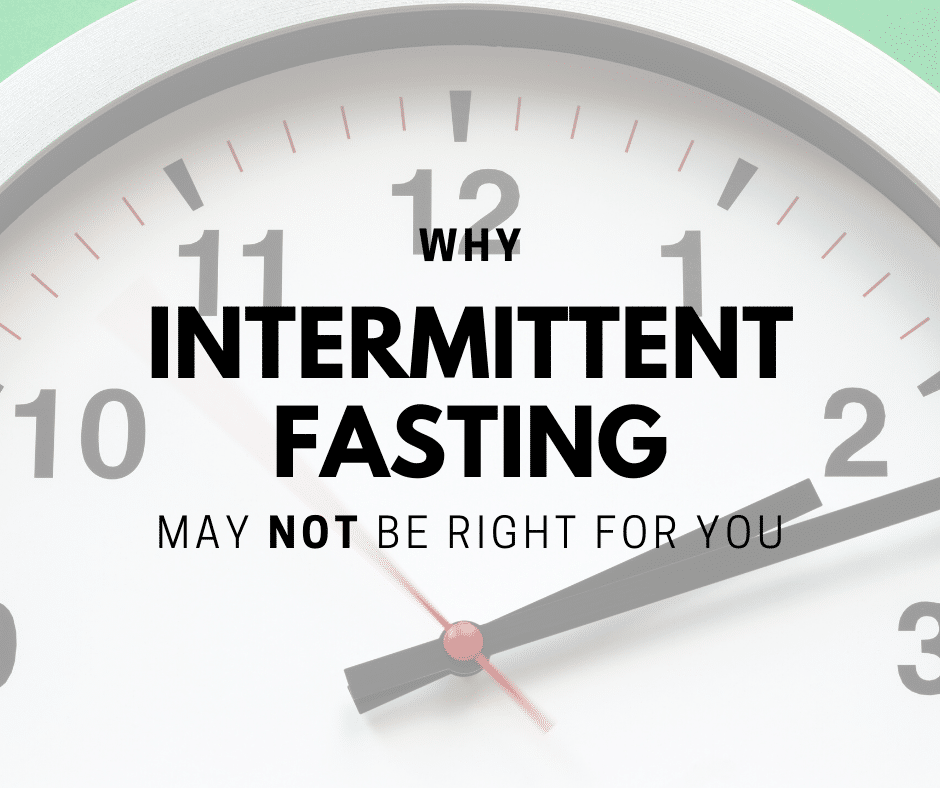Intermittent fasting (IF) is a popular way to not only lose weight, but also to reduce inflammation and glucose levels. Before you dive into IF, consider these factors because intermittent fasting may not be right for you.
What is intermittent Fasting?

Intermittent fasting means that you designate specific periods of time, either in hours or days, where you eat and don’t eat. There are a variety intermittent fasting options, with the most popular being the 16/8 fast or the 5/2 fast.
With the 16/8 fast, you have a 16 hour fasting period and an 8 hour eating window. So for example, your eating window might be from 10am to 6pm, 11am to 7pm, etc.
The 5/2 option is in days, not hours. With this schedule, you are not actually fasting at all or eating very little (500-600 calories) for 2 days and eating normally for 5 days.
In practice, the 5/2 plan might look like this: Sunday – eat, Monday – eat, Tuesday – fast, Wednesday – eat, Thursday – eat, Friday – fast, Saturday – eat.
Intermittent fasting isn’t just about eating and not eating at certain times. As with all diets, eating in a calorie deficit is the key to weight loss. IF scheduling will not work as a weight loss mechanism if, during that non-fasting period, you continue to eat more than what you need to maintain your current weight.
Why IF may not be right for you
Before you dive into an IF experiment as a means to lose weight, consider if it’s a program that makes sense. In some cases, there are valid reasons why intermittent fasting may not be right for you.
You have low blood sugar

Hypoglycemia is a condition where your blood glucose levels run low. Your body uses glucose as its main source of energy.
There are two different kinds of hypoglycemia, reactive and fasting. Reactive hypoglycemia occurs a few hours after you eat a meal. Fasting hypoglycemia is linked to medication or disease. Fasting hypoglycemia can be seen in patients being under insulin treatment or those taking certain medications for diabetes. In either case, when hypoglycemia does occur, it needs to be treated quickly, often with sugary drinks or snacks.
Studies show that individuals with Type 2 diabetes who were treated with hypoglycemia medications such as sulfonylureas actually had increased hypoglycemia if they were practicing intermittent fasting. While a very low-calorie diet can support weight loss and improve glucose levels the combination of calorie restriction and hypoglycemia medications actually increased the risk of hypoglycemia.
If you have a medical condition, intermittent fasting may not be right for you. It’s best to consult a doctor prior to trying intermittent fasting.
You prefer to exercise in the morning

My exercise of choice is lifting weights. My goal is to gain muscle and build strength. To do this, I have to lift heavy. To lift heavy, I have to fuel my body with some form of carbohydrate for energy.
My preferred exercise schedule is in the morning. I’m up at 4am every day to have a cup of coffee and then off to the gym – now my living room – to exercise for 30-45 minutes.
Prior to discovering macros, I tried IF for about 6 weeks. It took me a week to get over the morning hump of no coffee with creamer and sweetener, but I did it. By about the 4th week of IF, my workouts began to suffer. Even though it was only coffee with fat-free creamer and low-calorie sweetener, it wasn’t enough for the heavy lifting program I was following. I simply had no fuel for my workouts.
When your body has no glycogen – or stored carbohydrates – to burn, your body turns to fat stores as a source of fuel. Sounds great and seems to be exactly what we want to happen. Who doesn’t love the idea of fat loss?
But also consider this, when glycogen is in short supply, your body will also break down protein as a fuel source. And guess what your body needs to build muscle. You guessed it – protein.
During those unfueled early morning weight training sessions, I very may well have been burning fat. I was also feeling weak, headachy and on more than one occasion, dizzy. This was enough for me to realize that intermittent fasting wasn’t right for me and what I was trying to achieve.
You have Hashimoto’s disease

Hashimoto’s disease is an autoimmune disorder and occurs when your immune system attacks your thyroid. It destroys the thyroid tissue which results in a reduction of thyroid hormones. Consequently, you end up with hyperthyroidism.
For those who suffer from Hashimoto’s diseases, maintaining the body’s circadian rhythm is crucial. Your circadian rhythm is your body’s internal clock. Aside from regulating your sleep and feeding cycle, your circadian rhythm supports the cycle of hormone production, cell regeneration and other important biological processes. Eating on a regular schedule supports a healthy circadian rhythm and minimized the impacts of Hashimoto’s disease.
By definition, some intermittent fasting doesn’t lend itself to eating according to your body’s circadian rhythm. When the body’s natural eating cycle is disrupted on a continual basis it can have huge impacts on Hashimoto’s. For those with Hashimoto’s disease, maintaining a steady circadian rhythm is paramount, which means that intermittent fasting isn’t right for you.
You are breastfeeding

It is questionable if intermittent fasting is advisable for women who are breastfeeding. On average, women who are breast feeding need an extra 500 – 600 calories a day to support milk production and provide the necessary fluids and nutrients for their newborn and themselves.
For some breastfeeding women, fasting isn’t intentional as part of a weight loss diet, but rather in observance for religious holidays such as Ramadan or Yom Kippur. During the fasting period of Ramadan, which is from dawn to sunset over the course of a month, women reported that their milk supplies were reduced. The same study showed the concentration of certain micronutrients in the milk supply was also impacted.
Specific studies on the effects of intermittent fasting during breastfeeding are scant, so it’s best to consult with your physician to discuss the benefits of weight loss versus the impact of the nutritional and caloric needs of your newborn. You might be surprised to learn that intermittent fasting under these circumstances isn’t right for you.
You are on the borderline of an eating disorder

The National Association of Anorexia Nervosa and Associated Disorders reports that 30 million people in the US suffer from an eating disorder. The American Psychiatric Association defines an eating disorder “…Eating disorders are illnesses in which the people experience severe disturbances in their eating behaviors and related thoughts and emotions. People with eating disorders typically become pre-occupied with food and their body weight…”.
One of those eating disorders might cleverly be disguised as just wanting to ‘eat clean’. Under certain circumstances, it can veer into orthorexia. Orthorexia is an unhealthy obsession with wanting to eat healthy.
The obvious question is how can wanting to eat healthy be characterized as an eating disorder? It’s subtle but this occurs when your physical and mental well-being begin to suffer. You may change your social habits to avoid not being in control of your food choices. You become hyper-focused and make very rigid and specific food choices based ingredients or food quality.
When you overly obsess on any aspect of your food choices, preparation and consumption to the point where you feel anxious, shameful, or depressed, your relationship with food has taken an unhealthy turn.
The rigidity of an intermittent fasting schedule can tip you into an eating disorder like orthorexia. You anxiously wait for the clock to strike 10 am to break your fast, and stress when it approaches 6 pm, signaling that your fast must start. If you eat outside of your fasting window and experience feelings of guilt and failure for not being able to adhere to the schedule, this could signal the start of an eating disorder. If this sounds like you, intermittent fasting isn’t right for you and may exacerbate your already precarious eating behaviors.
You work shift work

My boyfriend, however, works shift work. For him, shift work is a combination of two weeks on day shift and two weeks on night shift. Furthermore, they’re 12 hour shifts staring at either 6am or 6pm. In case it looks confusing, it looks like this:
Week 1: Monday, Tuesday, Friday, Saturday, Sunday
Week 2: Wednesday, Thursday
This works well enough for a day shift, but what happens when he transitions to night shift? First consider that he’s coming off a 3-day weekend of days where he’s been awake all day and has to go back to a night shift on Monday. Does he eat during the day and nothing at night? Or vice versa? On that last Thursday, he’s coming home and going to sleep. How would that transition work?
I can’t even begin to figure out how intermittent fasting would work on a schedule like this. His entire circadian rhythm is out of whack, he’s eating at night when most people are sleeping, and sleeping during the day when most people are awake. If you can’t figure out how to eat with a goofy schedule like this, intermittent fasting certainly isn’t right for you.
You take daily medication

There are a wide variety of medications that have to be taken with food. This is necessary to guard again damage to the lining of your stomach. Others are required to be taken at the same time every day. Montelukast, a drug used as part of an asthma treatment protocol, is most effective if taken at bedtime.
Additionally, the effectiveness of some medications is reduced with drastic changes in your diet. This is especially true of the contractive effectiveness of progestin-only birth control. Other medications whose effectiveness may be affected by fasting are blood thinners, anti-psychotics, anti-depressants and transplant drugs.
An article published by Harvard Health Publishing suggests that “…people who take medications for blood pressure or heart disease also may be more prone to electrolyte abnormalities from fasting…”. This is pretty good proof that intermittent fasting may not be right for those on certain medications.
Conclusion
There is plenty of evidence that suggests that intermittent fasting has numerous health benefits from weight loss, to insulin control, improved heart health and reduction of inflammation.
What is equally clear is that intermittent fasting may not work for every person and every lifestyle. After considering these factors, you may find out that intermittent fasting may not be right for you.

